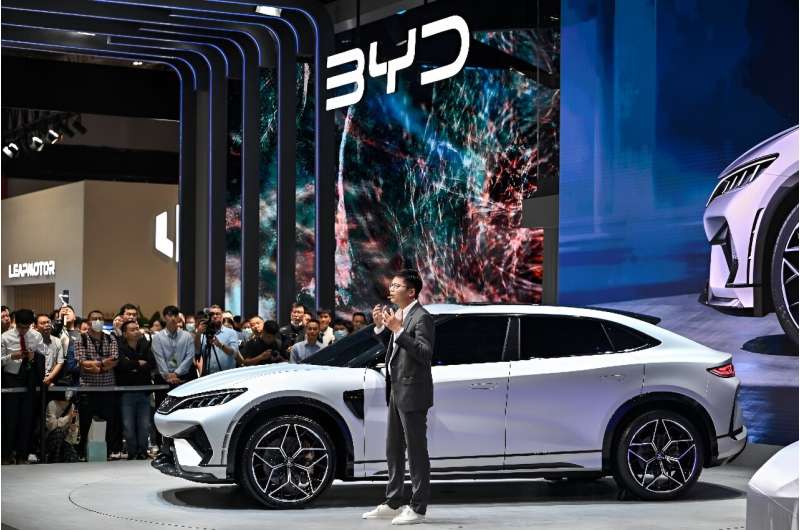This article has been reviewed according to Science X's editorial process and policies. Editors have highlighted the following attributes while ensuring the content's credibility:
fact-checked
reputable news agency
proofread
Chinese electric carmaker BYD triples half-year profit

BYD, China's leading electric carmaker, said on Monday its half-year net profit had tripled based on record demand.
BYD posted a net profit of 10.95 billion yuan ($1.5 billion) for the January-June period, up almost 205 percent year-on-year, the group said in a statement to the Hong Kong Stock Exchange.
The result was in line with estimates made by BYD in July of between 10.5 billion and 11.7 billion yuan.
Half-year sales were also up sharply year-on-year, rising 73 percent to 260.1 billion yuan.
Electric vehicle demand has soared in recent years in China, which is the world's biggest producer of greenhouse gases in absolute terms.
BYD, whose investors include US investment titan Warren Buffet, wants its sales to be dominated by electric and hybrid vehicles by 2035.
Generous subsidies have enabled sales to take off in recent years, while local manufacturers have also helped to spur growth in the industry.
"During the first half of 2023, Chinese automakers capitalized on the shift towards electrified, intelligent and networked vehicles, emerging as strong competitors in a fierce market," BYD said, later adding it ranked "first in the sales volume of passenger vehicles among Chinese auto companies".
Originally specializing in the design and manufacture of batteries, the company diversified into the automotive sector in 2003.
Foreign manufacturers, including Tesla, BMW, Mercedes and Audi, depend on BYD for their batteries.
The company this month became the first global manufacturer to pass the five million milestone in electric vehicle production, crowning itself "the world's leading manufacturer of new energy vehicles and power batteries".
Intense competition
Analysts say China is leading the way worldwide when it comes to electric vehicle development.
The country began investing heavily in associated technology from the early 2000s.
Central and local authorities poured billions of dollars into subsidies and tax breaks, and allocated public transport contracts to EV companies.
Based in southern China's tech hub Shenzhen, BYD ceased production of gasoline-powered cars last year, and is now focusing exclusively on hybrid and electric models.
The popularity of Chinese EV brands has soared in recent years, with BYD facing stiff competition from a number of local brands, including XPeng, Nio and Geely.
Under intense pressure to outdo each other, China's automakers have been engaging in a price war, especially as consumer spending slows amid the country's turbulent post-pandemic economy.
In July, BYD was still the biggest seller of electric vehicles in China, with around 262,000 units sold, according to the company.
"According to data from the China Automobile Association, in the first half of 2023, the market share of the Group's new energy vehicles further expanded to 33.5%, an increase of 6.5 percentage points compared with 2022, continuing to consolidate its leading position in China's new energy vehicle industry, and it also continued to rank No. 1 in global sales," its stock market filing said
By comparison, Tesla, its main competitor, sold around 64,000 units over the same period, according to the China Federation of Individual Car Manufacturers.
BYD has also overtaken Volkswagen cars as the best-selling auto brand in China.
© 2023 AFP





















